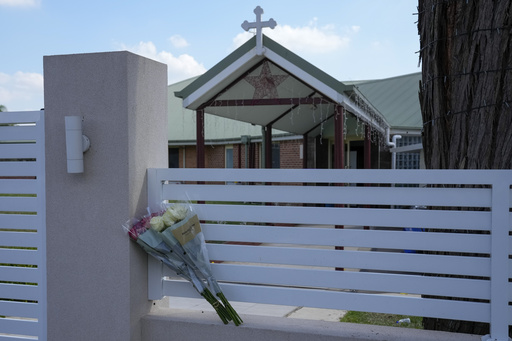
SYDNEY (AP) — Australian police arrested seven teenagers accused of following a violent extremist ideology in raids across Sydney on Wednesday to protect the community from a potential attack, officials said.
The seven, aged 15 to 17, were part of a network that included a 16-year-old boy accused of the stabbing of a bishop in a Sydney church on April 15, police said.
Five other teenagers were still being questioned late Wednesday by the Joint Counter-Terrorism Team, which includes federal and state police as well as the Australian Security Intelligence Organization, the nation’s main domestic spy agency, and the New South Wales Crime Commission, which specializes in extremists and organized crime.
More than 400 police officers executed 13 search warrants at properties across southwest Sydney because the suspects were considered an immediate threat, New South Wales Police Deputy Commissioner David Hudson said.
“We will allege that these individuals adhered to a religiously motivated, violent extremist ideology,” Hudson told reporters.
“It was considered that the group … posed an unacceptable risk and threat to the people of New South Wales, and our current purely investigative strategies could not adequately ensure public safety,” Hudson added.
Australian Federal Police Deputy Commissioner Krissy Barrett said investigators found no evidence of specific targets or timing of an intended “violent act.”
She said the police operation was not linked to Anzac Day on Thursday, a public holiday when Australians remember their war dead.
It has been a potential target of extremists in the past.
A 16-year-old was charged on Friday with committing a terrorist act, a crime that carries a maximum penalty of life in prison, following the knife attack in which an Assyrian Orthodox bishop and priest were injured.
An Australian Federal Court judge on Wednesday extended an order banning social media platform X from showing videos of Bishop Mar Mari Emmanuel being repeatedly stabbed.
Justice Geoffrey Kennett extended the ban, which the court put in place on Monday, until May 10.
X, formerly called Twitter, announced last week it would fight in court Australian orders to take down posts relating to the attack.
Australia’s eSafety Commission, which describes itself as the world’s first government agency dedicated to keeping people safer online, applied to the court for the temporary global ban.
Marcus Hoyne, a lawyer for X, told the judge on Wednesday that the bishop didn’t want the video banned. Emmanuel recently signed an affidavit “stating that he is strongly of the view that the material should be available,” Hoyne said.
Hoyne said the eSafety Commission was attempting to exercise “exorbitant jurisdiction” with “injunctions that effectively operate throughout the whole world.”
Hoyne also said a court ordered ban on the video “might be futile.”
“It appears that this material is now appearing in lots of different places,” Hoyne added.
The commission’s lawyer Christoher Tran said X had not complied with Monday’s order. Hoyne said he did not “have instructions about that one way or the other.”
X has not responded to The Associated Press’s questions on Tuesday about the company’s compliance with the order.
X’s owner, Elon Musk, has accused Australia of stifling free speech, while Australian Prime Minister Anthony Albanese has labeled Musk an “arrogant billionaire.”
“The Australian people want the truth,” Musk posted on his personal X account on Wednesday. “X is the only one standing up for their rights.”
Authorities blame social media for drawing a crowd of 2,000 people to converge at the Christ the Good Shepherd Church following the attack, which led to a riot in which 51 police officers were injured and 104 police vehicles were damaged.
The teen allegedly spoke in Arabic about the Prophet Muhammad being insulted after he stabbed Emmanuel and the Rev. Isaac Royel as a church service was being streamed online.
ASIO Director-General Mike Burgess confirmed that his organization was involved in Wednesday’s operation.
“Australia’s security service is always doing its thing to provide security intelligence that enables the police to deal with these problems when we have immediate threats to life or anything else that’s evolving,” Burgess said.
He said investigations of children had peaked at 50% of ASIO’s “priority counterterrorism case load” a few years ago and the number had since reduced.
But the number of minors under investigation was rising again for reasons including social media content, Burgess said.
“They’re a vulnerable cohort,” Burgess said.
___
McGuirk reported from Melbourne, Australia.
Source: post
